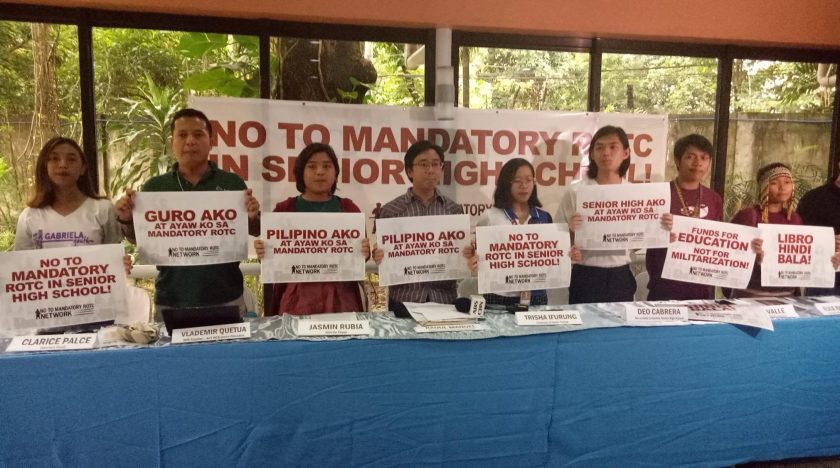“General Bato Dela Rosa should stop his illusion that many Filipinos would like to take ROTC.”
By ARNETH ASIDDAO
Bulatlat.com
MANILA — Youth groups, teachers, students, and children’s rights advocates denounced the proposed mandatory Reserve Officers Training Corps (ROTC) for senior high school (SHS) students in a press conference at University Hotel in UP Diliman, Wednesday, Aug. 28.
There are 13 House bills and eight Senate bills related to mandatory ROTC, highlighting the government’s legislative priorities.
The bills seek to amend Republic Act 9163 or the National Service Training Program Act of 2001, which has allowed college students to choose between ROTC, Literacy Training Service and Civil Welfare Training Service as part of their required National Service Training Program (NSTP).
Leaders of youth organizations said the proposal impedes on the youth’s right to choose and aims to “militarize and suppress their freedom of expression.”
Raoul Manuel of National Union of Students of the Philippines (NUSP), said that even government data show that less than 10 percent of the students take ROTC.
“That is why they are so intent on making it mandatory,” Manuel said, responding to Ronaldo “Bato” del Rosa’s claim during the Senate hearing last week.
Deo Cabrera, a Dela Salle University SHS student, said mandatory ROTC impedes on their right to choose.
“General Bato Dela Rosa should stop his illusion that many Filipinos would like to take ROTC,” said Cabrera.
‘Burden’
Teachers and students also maintained that mandatory military training would be another burden.
Vlademir Quetua, president of Alliance of Concerned Teachers-National Capital Region (ACT-NCR), said ROTC imposes an additional burden on teachers who are already suffering from heavy workload and low wages.
Quetua also questioned the P38 billion budget needed for mandatory ROTC when the proposed budget for the salary increase of teachers and government workers is only P31 billion.
He also mentioned the lack of facilities as another challenge that schools would have to face when mandatory ROTC is passed.
If passed, schools would be required to provide offices for the Department of National Defense and Armed Forces of the Philippines.
Manuel feared that mandatory ROTC would be used to justify tuition increase and additional expenses and force K+12 students who are already “bombarded with a lot of academic work” to spend their weekends in trainings.
Jasmine Rubia of Girls for Peace added, “If they can’t even implement K-12 properly, how can we ensure that the poorly-designed ROTC will be any better?”
’Culture of violence’
Youth groups and child rights advocates lambasted the ‘culture of violence, corruption and machismo’ being fostered by ROTC.
Tricia Ifurung, a student leader from the University of Santo Tomas, recalled the killing of ROTC cadet Mark Welson Chua after he exposed the corruption within UST’s ROTC unit in 2001.
In a story published by The Varsitarian in February 2001, Chua, along with fellow cadet Romulo Yumul, exposed the corruption in the ROTC program. Chua was abducted the following month and later found dead in the Pasig River.
Only two of four suspects in the Chua slay have been sentenced.
“If up until now there is no justice for Chua’s death, how can we have trust and confidence in this proposal to revive ROTC?” said Ifurung.
Chua’s death sparked a series of protest actions, which led to the abolition of the mandatory ROTC.
“We fought against this policy for more than a decade and now the government is promoting its reinstatement, as if they have forgotten Mark Welson Chua’s name,” Ifurung said.
Rubia said, “Those who are accused of psychological and physical abuse are not brought to justice,” said Rubia.
Rius Valle of Save Our Schools Network said the military “has no ascendancy to teach nationalism.”
Valle recounted cases of human rights violations and intimidation by the military in Lumad schools in Mindanao.
Eule Bonganay, secretary general of Salinlahi Alliance for Children’s Concerns, pointed out that ROTC is another anti-child policy, along with the proposal to lower of age of criminal liability and the ongoing human rights violations against students of indigenous schools.
Alternatives
ACT-NCR’s Queta proposed that instead of using the budget for ROTC and militarization, funds should be allowed to raise the quality of education.
For Ifurung, ROTC would not teach discipline and nationalism. “What we need instead is to bring back Wika at Panitikan courses in college and have a thorough discussion of history,” said Ifurung.
The groups formed the alliance No to Mandatory ROTC Network to amplify their call.
The post Youth, teachers, child rights advocates unite against mandatory military training appeared first on Bulatlat.





